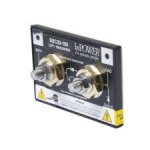I have never seen any discusion of using a solid state contactor for either the main or starter contactors. I know Vertical Power has the PPS, but never hear of anyone using just a contactor like the InPower Solid State Contactor.
This may not be the right solid state contactor for the application, but is there one?
This may not be the right solid state contactor for the application, but is there one?
Last edited:





